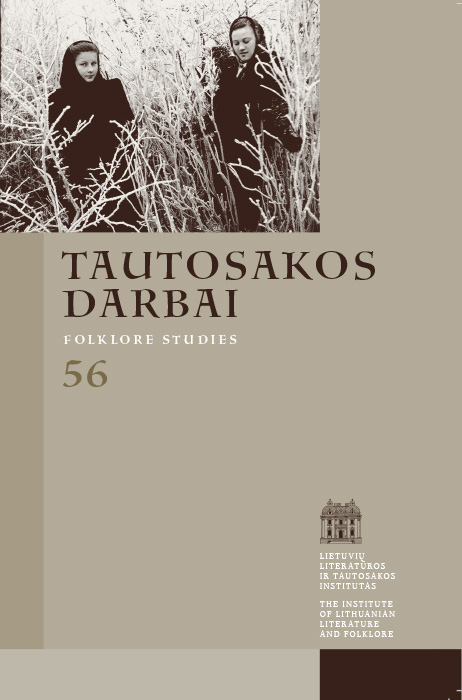Relationship to the Past and Its Peculiarities in the Autobiographic Narratives of the Post-War Vilnius Inhabitants
Abstract
In the course of the last three decades after restoration of independence in Lithuania, similarly to the other post-Soviet societies, interest in the past has increased significantly, prompting various new forms of interpretation and commemoration of the past to appear, grasping also the formerly prohibited, ignored or forgotten historical facts and personal experiences. Understandably, the Soviet period stands out as the most important in this respect and requires particular re-consideration. Initially, the official Soviet period, being heavily weighed with ideology, was regarded both in the public discourse and in the personal memoirs as an empty and lost time, which had to be discarded and forgotten. The collective memory of the nation was primarily directed at the period of the first independence (1918–1940), which had recently emerged from oblivion. This included the hitherto publicly suppressed victimological narratives of occupation, deportations, partisan resistance, and Holocaust. On the other hand, the general decline of the economic and social sphere, brought about by the change of the political regime, caused considerable amount of individual disappointment in the post-Soviet reality and led to certain revisionist and nostalgic idealization of the Soviet times. The post-war history of Vilnius was also subject to reconsideration.
The author of the article analyzes oral interviews collected in the course of fieldwork carried out for the research project „Plots of Individual Modernization in the Autobiographic Narratives of the First Generation Urban Inhabitants (Post-War Period in Vilnius)”, as well as some published memoirs and other sources. She investigates the life stories of people differing in terms of their ethnic background (Lithuanians, Jews, and Poles) and their fate. These stories reveal attitudes of the narrators towards Vilnius as their native city and towards its Soviet past, their views on different historical periods, including Soviet experience standing in contrast to the idealized pre-war image of the city. The nostalgic side is frequently especially prominent both in the published memoirs and in the oral autobiographic narratives, manifesting simultaneously as a specific feature of personal memory and as a way for impressive recreation of the past.
Downloads
Most read articles by the same author(s)
- Radvilė Racėnaitė, English Translations of 15th and 16th-Century Latin Sources on Baltic Religion and Mythology , Tautosakos darbai: Vol. 66 (2023): Tautosakos darbai
- Austė Nakienė, Radvilė Racėnaitė, Vita Ivanauskaitė-Šeibutienė, Rytis Ambrazevičius, Lina Būgienė, Gražina Kadžytė, Rima Visackienė, Irena Žilienė, Andželika Jakubynienė, Chronicle , Tautosakos darbai: Vol. 52 (2016)
- Jurga Sadauskienė, Austė Nakienė, Rytis Ambrazevičius, Asta Skujytė-Razmienė, Radvilė Racėnaitė, Gražina Kadžytė, Modesta Liugaitė-Černiauskienė, Vita Džekčioriūtė-Medeišienė, Eligija Garšvienė, Chronicle , Tautosakos darbai: Vol. 54 (2017)
- Radvilė Racėnaitė, What People Feared in Soviet Times: Expression of Everyday Fears in Urban Legends and Rumors , Tautosakos darbai: Vol. 64 (2022)
- Radvilė Racėnaitė, Rūta Žarskienė, Živilė Ramoškaitė, Asta Skujytė-Razmienė, Aušra Žičkienė, Chronicle , Tautosakos darbai: Vol. 51 (2016)
- Guntis Pakalnas, Rimantas Sliužinskas, Asta Skujytė-Razmienė, Radvilė Racėnaitė, Vita Ivanauskaitė-Šeibutienė, Rūta Žarskienė, Lina Leparskienė, Andželika Jakubynienė, Chronicle , Tautosakos darbai: Vol. 47 (2014)
- Radvilė Racėnaitė, Asta Skujytė-Razmienė, Ainė Skudutytė, Povilas Krikščiūnas, Gaila Kirdienė, Austė Nakienė, Rūta Žarskienė, Chronicle , Tautosakos darbai: Vol. 50 (2015)
- Radvilė Racėnaitė, Irena Žilienė, Chronicle , Tautosakos darbai: Vol. 59 (2020)
- Radvilė Racėnaitė, Vita Džekčioriūtė, Foreword , Tautosakos darbai: Vol. 66 (2023): Tautosakos darbai
- Radvilė Racėnaitė, Vita Džekčioriūtė, Preface , Tautosakos darbai: Vol. 67 (2024): Tautosakos darbai
